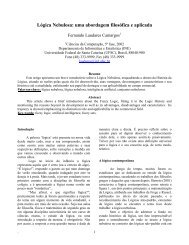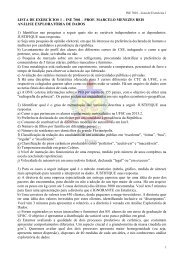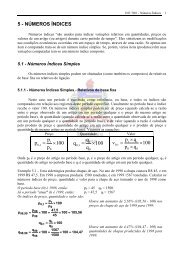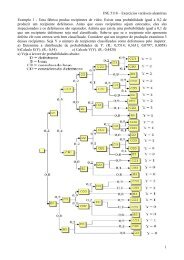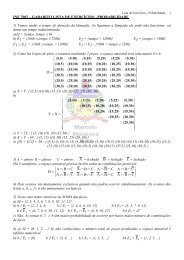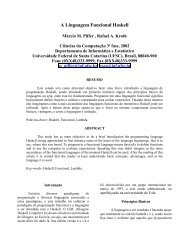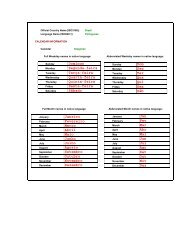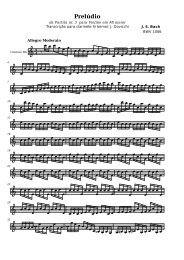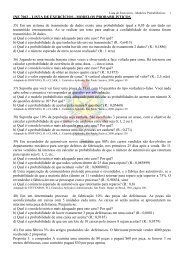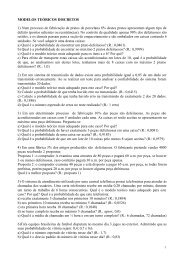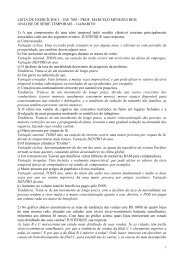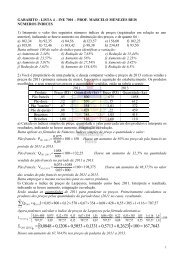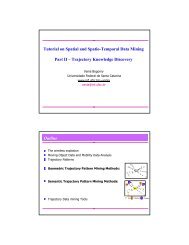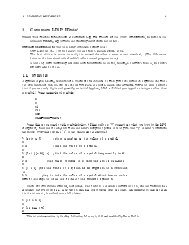Anais do IHC'2001 - Departamento de Informática e Estatística - UFSC
Anais do IHC'2001 - Departamento de Informática e Estatística - UFSC
Anais do IHC'2001 - Departamento de Informática e Estatística - UFSC
Create successful ePaper yourself
Turn your PDF publications into a flip-book with our unique Google optimized e-Paper software.
<strong>Anais</strong> <strong>do</strong> IHC’2001 - IV Workshop sobre Fatores Humanos em Sistemas Computacionais 143<br />
5. Conclusão<br />
O estu<strong>do</strong> apresenta<strong>do</strong> neste artigo foi resulta<strong>do</strong> da avaliação da interação tutor e aluno em<br />
alguns agentes pedagógicos anima<strong>do</strong>s existentes. Esse estu<strong>do</strong> nos permitiu levantar<br />
requisitos e funcionalida<strong>de</strong>s necessários para a <strong>de</strong>finição <strong>de</strong> aspectos <strong>de</strong> interface e<br />
interação <strong>de</strong> um sistema <strong>de</strong> ensino volta<strong>do</strong> a aprendizagem colaborativa. Resumidamente,<br />
observamos a necessida<strong>de</strong> <strong>de</strong> explorar comportamentos emocionais nos agentes a fim <strong>de</strong><br />
(a) oferecer uma interface mais natural ao aluno que consi<strong>de</strong>re a sua natureza social e (b)<br />
trabalhar aspectos afetivos <strong>de</strong> forma a proporcionar resulta<strong>do</strong>s positivos na aprendizagem<br />
(Goleman, 1995) (Hayes-Roth, 1998).<br />
Inicialmente, iremos realizar os levantamentos que o estu<strong>do</strong> <strong>de</strong>ste artigo apontou ser<br />
necessário: <strong>de</strong>finição <strong>de</strong> comportamentos afetivos que propiciem um melhor aprendiza<strong>do</strong><br />
ao aluno, <strong>de</strong>senvolvimento <strong>de</strong> uma arquitetura emocional <strong>do</strong> agente para que responda<br />
emocionalmente <strong>de</strong> forma coerente às ações <strong>do</strong> aluno e integração da arquitetura <strong>do</strong> agente<br />
com o mo<strong>de</strong>lo <strong>do</strong> aluno proposto por Bercht (Bercht et al., 1999). Após essa etapa, será<br />
realizada a implementação em Java <strong>de</strong>sse agente. No presente momento, o agente<br />
semiótico, o agente <strong>de</strong> diagnóstico e o agente media<strong>do</strong>r encontram-se em<br />
<strong>de</strong>senvolvimento.<br />
6. Referências Bibliográficas<br />
(Andra<strong>de</strong> et al., 2001) ANDRADE, Adja; JAQUES, Patricia; VICARI, Rosa; BORDINI, Rafael; JUNG,<br />
João. A Computational Mo<strong>de</strong>l of Distance Learning Based on Vygotsky's Socio-Cultural Approach.<br />
MABLE Workshop (AI-ED 2001) San Antonio, Texas, Maio 19-23 2001.<br />
(Bates, 1994) BATES, Joseph. The Role of Emotion in Believable Agents. Communicat. of ACM. Julho,<br />
1994.<br />
(Bercht et al., 1999) BERCHT, M.; MOISSA, H.E.M; VICCARI, R.M. I<strong>de</strong>ntificação <strong>de</strong> fatores<br />
motivacionais e afetivos em um ambiente <strong>de</strong> ensino e aprendizagem. SBIE’99. Novembro 23-25, 1999,<br />
Curitiba, PR (Poster).<br />
(Elliot et al., 1997) ELLIOTT, Clark, RICKEL, Jeff e LESTER, James C. Integrating Affective Computing<br />
into Animated Tutoring Agents. Working Notes of the IJCAI '97 Workshop on Animated Interface<br />
Agents: Making Them Intelligent, pp. 113-121, Nagoya, Japan, August 1997.<br />
(Elliot e Brzezinski, 1998) ELLIOTT, Clark; BRZEZINSKI, Jack. Autonomous Agents as Synthetic<br />
Characters. Software Agents. BRADSHAW, Jeffrey (Ed.). AAAI Press/The MIT Press, 1998.<br />
(Elliot et al., 1999) ELLIOT, Clark; RICKEL, Jeff; LESTER, James. Lifelike Pedagogical Agents and<br />
Affective Computing: An Exploratory Synthesis. In M. Wooldridge and M. Veloso (Eds.), Artificial<br />
Intelligence Today , Lecture Notes in Computer Science 1600, Springer-Verlag, pp. 195-212, 1999.<br />
(El-Nasar et al., 1999)EL-NASAR, Magy; IOERGER, Thomas; YEN, John; HOUSE, Donald; PARKE,<br />
Fre<strong>de</strong>ric. Emotionally Expressive Agents. Proceedings of Computer Animation '99, 1999.<br />
(Freire, 1995) Freire, Paulo e Fagun<strong>de</strong>s, Antônio. Por uma Pedagogia da Pergunta. Ed. Paz e Terra, Rio <strong>de</strong><br />
Janeiro, 1995.<br />
(Goleman, 1995) GOLEMAN, Daniel. Inteligência Emocional. Objetiva, 19995.<br />
(Gürer, 1998) GÜRER, Denise. The Use of Distributed Agents in Intelligent Tutoring. In: ITS’98 Workshop<br />
On Pedagogical Agents, 4, 1998, San Antonio. p.20-25.<br />
(Hayes-Roth, 1998) HAYES-ROTH, Barbara. Interacting with Animated Characters: Puppets, Barten<strong>de</strong>rs<br />
and Auto Salespersons. Stanford, 1998. Technical Report (KSL-98-07) – Stanford University.<br />
(Huard, 1998) HUARD, R. Character Mastery with the Improvisational Puppets Program. Stanford, 1998.<br />
Technical Report (KSL-98-11) – Stanford University.<br />
(Jennings et al., 1998) JENNINGS, N.; SYCARA, K.; WOOLDRIDGE, M. A Roadmap of agent research<br />
and <strong>de</strong>velopment. Journal of Autonomous Agents and Multi-Agent Systems, 1:275-306, 1998.<br />
(Johnson et al., 1998) JOHNSON, Lewis; SHAW, Erin; GANESHAN, Rajaram. Pedagogical Agents on the<br />
Web. In: ITS’98 Workshop On Pedagogical Agents, 4, 1998, San Antonio. p.2-7.



